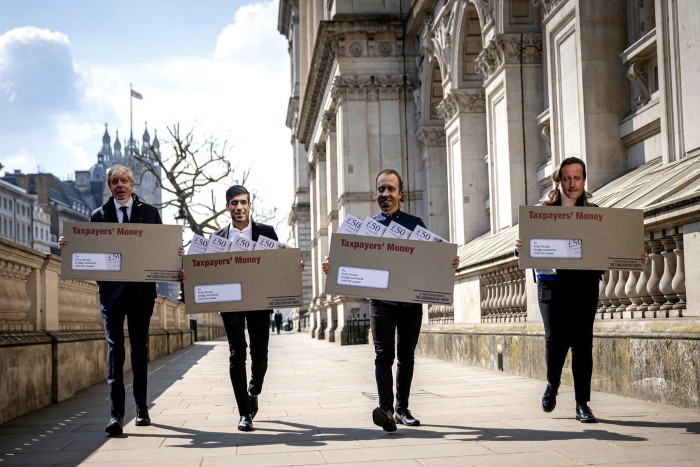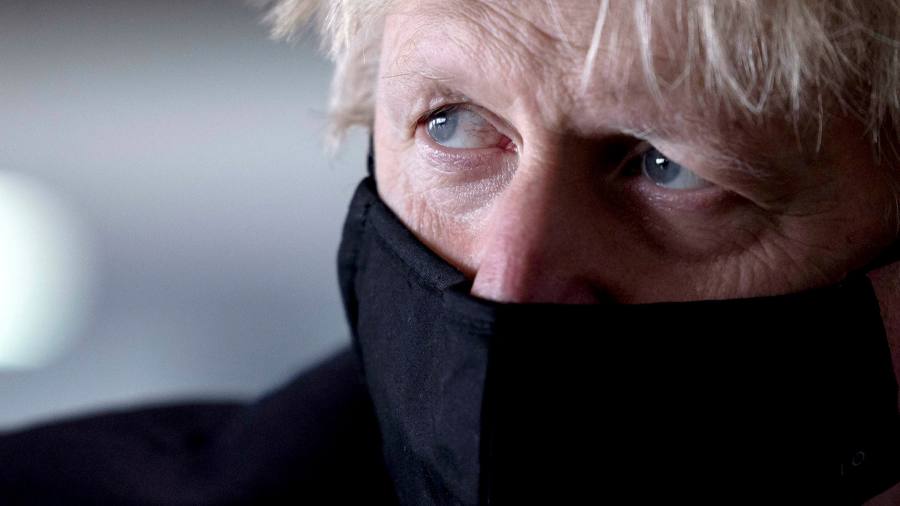[ad_1]
It is not the first time Boris Johnson has been accused of lying. Britain’s prime minister was once sacked as a Times journalist for making up a quote and dismissed as a Conservative opposition spokesman for failing to tell the truth to his party leader about an extramarital affair. Now, installed in Number 10 Downing Street, Johnson’s familiarity with the truth has taken on far greater significance.
Even in Britain’s rumbustious political system, it is rare for a politician to be accused outright of lying. But that has not stopped his opponents. “Are you a liar?” asked Ian Blackford, the Scottish National party’s leader at Westminster last week. Keir Starmer, Labour leader, reminded Johnson that ministers who lied in the House of Commons were obliged to resign. Even the BBC disregarded Johnson’s outright denial that he said last year he would be willing to see “bodies piled high” rather than impose a third Covid lockdown, reporting the remark as fact.
Johnson’s refusal to say who initially paid for a lavish refurbishment of his Downing Street flat has raised renewed questions about his willingness to confront the truth. Meanwhile Northern Ireland, which marks its centenary on May 3, continues to be contorted by the political fallout of Brexit, which saw Johnson agree to a new economic border in the Irish Sea, splitting the region from the rest of the UK. “There will be no border in the Irish Sea,” Johnson promised in August 2020 before the Brexit deal was reached, in another remark that has prompted accusations of lying. “Over my dead body.”
As voters across Britain prepare for local and mayoral elections on Thursday, Johnson has been submerged under a tide of hostile headlines from friendly newspapers, his integrity called into question, and he has entered a dangerous briefing war with Dominic Cummings, his former chief adviser. “Dom has a suicide vest on and he’s waving two machetes,” says one Johnson supporter.
“Boris on the ropes,” declared the Daily Mail last week. But is he? Britain’s idiosyncratic prime minister insists that the public “don’t give a monkeys” about a lot of the media coverage of his chaotic premiership and, to the dismay of his critics, he may be right. Opinion polls suggest that Johnson’s Conservatives — who 18 months ago won an 80 seat majority in the general election — could be heading for a good set of results on Thursday and that it is Starmer who is in trouble.
With about 5,000 posts up for grabs across England alone, the local elections are a significant test of the mood of the country as it looks forward to life after the pandemic. Johnson is hopeful the Conservatives can win in former Labour areas including Tees Valley and the West Midlands and, possibly, a parliamentary by-election in the solidly working class town of Hartlepool in north-east England.
As Covid-19 antibodies course through the veins of the British electorate, Johnson hopes that a “vaccine bounce” will help him turn the tables on his detractors. But have the events of the past few days revealed flaws in Johnson’s character and style of government which could eventually contribute to his downfall?
Impatient approach
Johnson was already facing criticism of his casual approach to government when he decided to declare war on Cummings. Labour had accused Johnson and fellow ministers of operating a “favours for chums” style, in which text messages from friends were answered with offers of help. The criticism extended to former prime minister David Cameron, who lobbied Treasury and Downing Street officials on behalf of Greensill Capital. It later transpired Johnson’s phone number had been widely available on the internet for 15 years.

The prime minister believed Cummings was responsible for a series of hostile leaks and decided to brief three national newspaper editors on April 23 to that effect. Tory MPs described that decision as “mad”; the prime minister’s aides pleaded with him not to do it, according to Downing Street officials.
Cummings’ response was predictable and ferocious. In a lengthy blog he said his former boss fell “far below the standards of competence and integrity the country deserves” and he lifted the lid on Johnson’s “unethical, foolish, possibly illegal” plan to have donors secretly pay for the renovation of his Number 10 flat. Johnson denies wrongdoing and says he paid for all the work, but he refuses to say who initially paid for it and whether he is secretly beholden to a mystery benefactor.
“I don’t think he has ever learned the advisability of obeying certain rules,” says Andrew Gimson, Johnson’s biographer. “He gets impatient when he is told you can’t do this or that.”
Johnson’s observance of convention had already been called into question this year following new claims by Jennifer Arcuri, a US businesswoman, that she had an affair with Johnson while he was mayor of London. She received £126,000 of public money in the form of grants for her technology business and event sponsorship. Asked whether he had acted with “honesty and integrity” in that relationship, Johnson replied: “Yes.” He has consistently denied wrongdoing.
Under the normal terms of British politics, a Conservative prime minister would be alarmed at the torrent of media criticism in the past two weeks. Yet Johnson breezily insists there “is nothing to see here” and that he remains focused on issues people care about most, notably fighting the Covid-19 pandemic.

The polls suggest remarkably solid Conservative leads over Labour, in spite of the furore. A YouGov survey conducted on April 27-28 — covering the day when Starmer labelled Johnson “Major Sleaze” — was typical: it gave the Conservatives an 11-point lead over the opposition, with the Tories on 44 to Labour’s 33. Johnson leads a party that has been in office since 2010.
Signs of decay
The backdrop for Starmer’s campaign on “sleaze” — a useful hanger on which to attach any number of unrelated scandals — is very different to the sleaze campaign successfully waged by Tony Blair against John Major’s exhausted Tory government in the 1990s.
Then, there was a clamour for change and Blair — whose opposition Labour party at times commanded a 30-point opinion poll lead — seemed to embody it. The word “sleaze” — capturing an assortment of financial and sexual scandals — evoked the sense of a Tory government in a state of decay after more than 15 years in power.
There is little sign yet that the voters want to ditch Johnson, nor that they see Starmer in anything like the same light as they saw the youthful Blair. Starmer’s YouGov approval ratings have declined — falling from plus 22 to minus 24 in under a year — while Johnson’s appear to have improved with every Covid-19 jab.
Anthony Wells, director of political polling at YouGov, says Brexit and coronavirus were such momentous events in Britain’s national life — and Johnson’s style of government is so unique — that some people seem to have forgotten that the Conservatives have been in power for over a decade. It is almost as if Johnson has reset the clock.

Wells says some of the allegations made against Johnson — notably regarding the financing of his home improvements — are not cutting through to voters. The issues might be too far removed from voters’ lives or too convoluted. “He borrowed some money off someone and then paid it back — it fails the ‘man in the pub’ test [of concerning voters],” he says.
Conservative MPs roll their eyes at Johnson’s handling of the Downing Street flat controversy. “Why doesn’t he just come clean?” sighs one leading Conservative MP, but most of them are keeping their heads down. One former cabinet minister says: “The cabinet and parliamentary party won’t do anything while they see him to be a vote winner.”
But the concerns are there nevertheless. While Tory MPs insist that few voters raise questions of “sleaze” on the doorstep, they admit that many traditional Conservatives do not like it.
A profile of Carrie Symonds, Johnson’s fiancée, in Tatler magazine especially raised Tory hackles, after the magazine reported that she wanted to rid the Downing Street flat of “nightmare” furniture installed by Theresa May, former prime minister, from John Lewis — a store beloved by middle Britain.
“They especially don’t like the idea that the PM and Carrie thought that John Lewis furniture wasn’t good enough for them,” says one veteran Tory MP, referring to local party members. “A lot of our supporters aspire to owning John Lewis furniture.”

Symonds, a former head of communications for the Conservative party and a political player in her own right, oversaw the flat refurbishment and has been dubbed on social media “Carrie Antoinette”. Many Tory MPs believe she wields too much influence. However, Zac Goldsmith, a Tory minister and friend of Symonds, counters that she is the victim of “1950s sexism”.
Election risk
Some Conservatives believe the stream of negative headlines about Johnson could depress Tory turnout in elections where “getting out the vote” is crucial, particularly in wealthier less urban areas. Working class former Labour voters in so-called “red wall” seats in northern England seem to be less bothered, according to Tory campaigners. The latest YouGov poll shows the Tories with a 19-point lead over Labour among working-class voters.
Starmer has told colleagues that people are starting to mention Johnson’s personal conduct on the doorstep, but not to the extent that it is likely to fundamentally change the result of Thursday’s elections. “They’re talking about it, but I’m not sure it will change the way they vote,” says one ally.
The Labour party is braced for a series of poor results, especially in its old heartlands. But Starmer hopes he is at least planting seeds of doubt in voters’ minds. While Johnson is stealing Labour’s clothes with his promise to “level up” Britain’s unequal economy — pledging to help traditional working class seats in the north — Starmer is trying to persuade voters that the prime minister is more interested in helping his friends or feathering his own nest; that he cannot be trusted.
Labour strategists accept that Johnson is reaping the political rewards from Britain’s swift rollout of almost 35m first Covid-19 vaccinations — but they believe that by the time of the next general election in either 2023 or 2024 the coronavirus pandemic will appear as a unique event disappearing in the rear-view mirror.

The opposition also hopes that Johnson’s recent conduct exposes fissures in his government which could widen in the months ahead. In particular, Tory MPs are growing worried that the prime minister lacks heavyweight advisers whose counsel he is willing to heed when they say “No”. Johnson’s willingness to conduct his own media briefing war against Cummings — against the advice of his officials — is seen by some Tory insiders as ominous.
“Briefing the newspapers against Dom was one of the maddest things I’ve seen for a long time. Why do it now when you are less than a fortnight away from local elections?” says one Tory MP. In recent times many of Johnson’s most influential advisers have quit or been ousted. “When he turns around, who is there to support him?” the Tory MP says. “Who are his allies?”
Cummings, for all his faults, was willing to stand up to Johnson. He was ejected last November after a power struggle. Johnson’s main advisers now tend to be what Tory insiders call FoCs — “friends of Carrie” — but with little personal loyalty to the prime minister. Some were former advisers to Michael Gove, the Cabinet Office minister who betrayed Johnson to run against him in the 2016 Tory leadership contest.

Eddie Lister, Johnson’s consigliere from his days as London mayor, has quit, while James Slack, a respected former communications chief, has left to join The Sun newspaper. The cabinet secretary, Simon Case, and Dan Rosenfield, his chief of staff, are new into their jobs and are struggling to impose order.
Test of integrity
With Cummings now gunning for revenge, Johnson is braced for more revelations about the prime minister’s handling of Covid-19 — possibly including emails and audio tape. Johnson’s integrity and attention to detail will come under increasing scrutiny. But for now, Tory MPs still regard their prime minister as a vote-winning machine with an ability to connect with voters who are not traditional Tories.
One Tory grandee says of recent criticism of Johnson’s governing style: “It’s a bit like his marital infidelity — it’s in the price. A lack of attention to detail is expected. The casualisation of government is probably the most important thing in the long run. But it should not have come as any surprise. People would far rather not have these stories dominating the media. But if the elections go as it looks like they will, I think people will be reasonably calm.”

If Johnson emerges with important victories on Thursday, the recent pressure on him may ease. Although he is struggling to define — let alone deliver — his “levelling up” agenda, he can look forward to a post-Covid economic rebound and the chance to hone his “global Britain” agenda as the country hosts the G7 summit in June and UN COP26 climate summit in November.
Dominic Grieve, former attorney-general, recently described Johnson as a “vacuum of integrity”. But another former Tory cabinet minister says: “It’s only when, or if, it is shown that voters care about issues about integrity that the parliamentary party and cabinet will do something about it. That doesn’t seem to be the case at the moment.”
Gimson says recent events reinforced the prime minister’s public persona as “someone who won’t be imprisoned by the establishment”. Donald Trump saw a political soulmate in Johnson, calling him “Britain Trump”, but the US eventually tired of its unconventional president. Will the UK eventually tire of Johnson’s chaotic style of government? “One day we probably will,” says Johnson’s biographer.
[ad_2]
Source link

